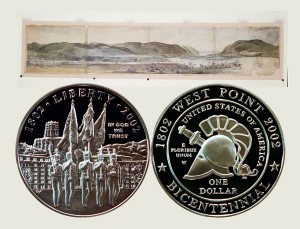Today, the West Point Commemorative Silver Dollar Coin remembers the meeting between Arnold and Andre 236 years ago.
Long recognized as a strong military outpost along the Hudson River, Benedict Arnold, in his peevishness, gained command of the stronghold with the desire to give it to the British.
The Book of History: The United States. Canada. Newfoundland. The West Indies published in 1915 gives the following summary of the meeting that fortunately failed.
=====
At this time, when all seemed dark, another catastrophe occurred.
Benedict Arnold had raised a company immediately after Lexington, had taken part in the capture of Ticonderoga, had led the unsuccessful expedition against Quebec and by his desperate retreat held back invasion from Canada for a year.
He was a daring fighter, and his qualities of leadership were displayed on other occasions, particularly at Saratoga.
Congress had promoted junior officers of less ability over him, and the discrimination rankled, even after his relative rank had been restored.
When Howe evacuated Philadelphia in 1778, Washington put Arnold, who had not recovered from the wound received at Saratoga, in command of the city.
It was an unfortunate selection, as many delicate questions were to be settled; and Arnold was hasty in speech and act, headstrong and tactless.
While here he married Miss Margaret Shippen, a member of a prominent Tory family, and was thrown much in Tory society.
Quarrels with Congress and with the government of Pennsylvania followed, and charges were brought against him.
He was acquitted on all except two, both trivial, which might well have been overlooked, but his enemies succeeded in sentencing him to be reprimanded by Washington.
The reprimand which Washington imposed was in fact a eulogy, but Arnold was cut to the quick by the disgrace and brooded over his wrongs.
Besides he was deeply in debt, as he had lived beyond his means.
Finally he determined to betray his country.
Perhaps he was able to convince himself that he would really be serving his country by such action.
The French alliance was not altogether popular, and many people feared the ultimate consequences.
The British government had offered to grant all the American demands except independence.
Congress had proved itself inadequate to govern.
Would it not be better to give up the idea of independence and accept the substance?
Such ideas we know were held in those years by many men who had earlier favored resistance to the British Parliament.
Of course these do not in the slightest degree excuse Arnold’s treachery, particularly the betrayal of the confidence which Washington had always shown him, but they, together with his keen feeling of his wrongs, may serve to explain his conduct.
Arnold saw that if West Point could be gained by the British, the line of the Hudson would be opened, and only a miracle could save the American cause.
Therefore, forgetting the trust which Washington had always shown him, he sought and gained the command of West Point in July, 1780.
Under an assumed name, he had already had some correspondence with Major Andre, Sir Henry Clinton’s adjutant.
Finally a personal meeting was arranged and September 21, 1780, Andre and Arnold met to arrange the details.
In return for the surrender of the fort, Arnold was to receive 10,000 guineas and a brigadier general’s commission in the British army.
Andre disobeyed the orders he had received to accept no papers, thinking perhaps to gain a firmer hold upon Arnold.
He was unable to return to New York by water, and was stopped near Tarrytown by a small band of irregulars, who found the compromising papers in his boots.
Arnold was informed of the capture and fled to the British lines, just in time to avoid meeting Washington, who reached West Point the same day.
Andre was tried by a military commission, convicted as a spy and hanged.
Few cases in military history have excited more pity than the death of this young officer, who won the hearts of all whom he met.
Arnold’s lot was not happy.
Though he was paid for his treason, he was often insulted, and is said to have died in his old uniform, deeply regretting his treachery.
His wife followed him to England and some of his descendants attained honorable positions.
=====
The West Point Commemorative Silver Dollar Coin shows with a panoramic image of the area, circa 1778.
